Renowned wildlife photographer and writer Roger Caras once said, “Dogs are not our whole life, but they make our lives whole.” His statement rings very true in our busy, multi-faceted lives. Dogs provide us with comfort and stability amid the chaos. Yet when most people think about maintaining a healthy balance between work and home life, they focus most of their attention on their partners and children, not realizing what an immense impact an irregular schedule can have on their beloved pooch. It is important that we do our part to ensure the stress of our work doesn’t negatively impact our dogs.
Dogs are inherently creatures of habit and love to stick to a routine. Dogs who adhere to a daily routine are generally not only more obedient but can also, in some instances, be more loyal to their owners. When something upsets a dog’s routine, like his owner going away on holiday or engaging in shift work, his entire world can be turned upside down, making him anxious, stressed and even prone to depression.
Dealing with separation anxiety
If your dog suffers from separation anxiety, being away from you when you work irregular hours can cause severe anxiety, stress, and depression. Your once happy and playful dog can become extremely anxious, turning to destruction as an outlet for his emotions. While some dogs may soil your floors and furniture, others find solace in chewing your shoes, couches and anything else they can lay their paws on. Dogs who are extremely panicky may even try to escape in a bid to find you, which puts them at a tremendous risk of getting injured or stolen.
What do you do when you see your dog suffer from separation anxiety? You can’t quit your job or simply give him away, but you can attempt to train him to handle the separation better.
Train your pet to handle the separation better
If your dog’s anxiety is mild, he can most likely be soothed by small treats when you leave for work. Spend a few minutes stroking and reassuring him in a calm, loving voice prior to your departure, and provide him with some toys and bites to eat when you leave, which you take away upon your return. This will allow your dog to associate you not being at home with something positive, thus easing his nerves.
If his anxiety is severe, it may require a bit more patience and training. If all your efforts seem fruitless it is best to consult with your vet, as an underlying condition could be making your dog’s condition worse, or he may need medication to help treat his anxiety.
Stick to a routine as much as possible
Regardless of the hours you work, it is important for both you and your dog to stick to a routine whenever possible. When you return from your shift needing to sleep during the day, invite your dog to come lay down with you. It may take some time to get him to do what you want, but in time you will both end up having a peaceful snooze when you need it most. Try to take your dog for walks at the same time every day, irrespective of whether it is as you return from your shift or just before you leave for work. If your dog stays outside during the day you can leave him to frolic around while you doze off, making a point to spend some quality time with him before you have to leave for work.
As stressful as irregular work hours may initially seem to both you and your dog, there are very effective ways to deal with the subsequent anxiety and stress. Remaining calm and showering your dog with love and affection while sticking to a realistic routine can go a very long way. Not only will doing so help keep him happy and stress-free, but it will also result in you getting enough sleep and experiencing less stress as well.
Featured image credit Mike Burke, Unsplash






1 Comment
As you said, Jocelyn, the best preparation is to train your dog to behave during those separation times because it would be really difficult for one to handle the dog with all sorts of job operations. So, ultimately a dog has to be alone for some time.